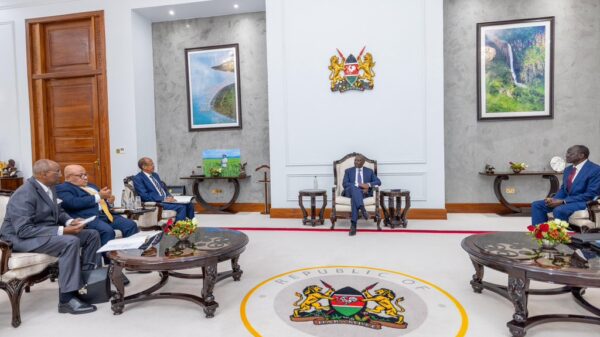NAIROBI, Kenya, Oct 27 – Environment Permanent Secretary Lawrence Lenayapa has blamed the culture of impunity for the unresolved Mau forest crisis.
Mr Lenayapa said on Tuesday that it was upon the political leadership to take a stern stand and act to stop the destruction of the largest water tower.
“We cannot continue destroying our forests and getting to donors seeking funds to rehabilitate forests that we have continuously destroyed. It’s shameful!,” the PS said.
Last month Prime Minister Raila Odinga began a formal campaign for the restoration of the Mau Forest Complex and other water towers with a series of bilateral meetings on the sidelines of the UN General Assembly in New York.
The Mau complex covers an area of 400,000 hectares but only 100,000 hectares remains, the rest have been destroyed through encroachment, according to the Kenya Forest Service.
“We have watched the destruction of Mau, we have been there and then after destroying Mau we run to donors seeking funds,” Mr Lenayapa said.
United Nations Development Programme (UNDP) Country Representative Tomoko Nishimoto said lack of proper policies and governance had led to the situation Kenya was in.
“The need for assistance is huge which means you cannot go on requesting development partners to come and address the problem,” Ms Nishimoto said.
“You really have to put the policies, development strategies and transform completely the way you deal with effects of climate change,” she added.
At the same time, the Environment PS said Kenya’s forest cover could be reclaimed in less than five years if every Kenyan planted 10 trees annually.
Mr Lenayapa said if this was practised, it could be part of the solution to the challenges Kenya was facing as a result of the negative impacts of climate change and urged all Kenyans to take responsibility towards mitigating climate change.
“We expect everybody young and old to do the same towards mitigating climate change,” the PS said.
“We must take the issue of climate change very seriously because Kenya is extremely vulnerable. Our economy relies heavily on climate vulnerable sectors such as agriculture, water, energy, transport and tourism,” he added.
Former Environment Permanent Secretary Professor George Krhoda said land use changes were also responsible for the impacts we felt from climate change.
“The intensity and frequency of climate change will increase where instead of short dry or wet spells, we will experience long periods of rain or drought,” he said.
Professor Krhoda noted that Kenya and the rest of the world could not afford to ignore climate change anymore because the impacts were severe and felt across the board.
He noted that climate change was expensive to the economy saying Kenya lost Sh66 billion in the transport sector and Sh4.5 billion in health infrastructure as a result of the 1997/1998 El Nino rains, which is an extreme rain period.
“We have a Sh387 billion economy so you can see such losses mean a lot,” the former PS said.
Professor Krhoda said developing nations must be prepared for climate change politics, like the fact that Africa was financially constrained, as they go to the crucial climate talks in Copenhagen in December
“These politics deny Africa the negotiating power and may come out of the talk with a deal that is not Africa friendly,” he warned.
He accused developed countries of failing to show good leadership in environmental governance because of their high green house gas emissions and failure to invest more in Clean Development Mechanisms (CDM) which would help mitigate climate change.
The UNDP Country Representative said successful participation and engagement in Copenhagen would provide Kenya with an opportunity to articulate its position on climate change issues and provide a framework for the country to gain from financial and technological transfers.
“It is not an easy negotiation; it is as much as technical negotiation and also the political negotiation,” she said.
They were speaking at a National climate change consultative meeting in Nairobi, a lead up to the Copenhagen talks in December where the world is expected to come with another climate change deal that would replace the Kyoto protocol which expires in 2012.
































